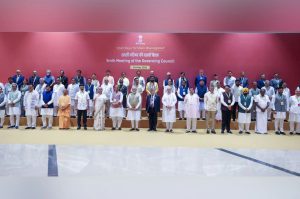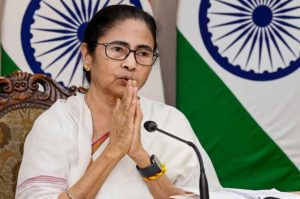West Bengal CM Mamata Banerjee snubs NITI Aayog meet just days before PM Modi’s scheduled visit to the state. Explore the political implications, Centre-state relations, and the deeper issues behind the boycott.
In a politically charged move, West Bengal Chief Minister Mamata Banerjee snubbed the 10th Governing Council meeting of NITI Aayog, held in New Delhi on May 24, 2025. The meeting, chaired by Prime Minister Narendra Modi, was designed to foster cooperation between the Centre and states under the ambitious “Viksit Bharat @2047” initiative. However, Mamata Banerjee’s absence—just days before PM Modi’s tour of West Bengal—has reignited debates around Centre-state relations, federalism, and the actual role of NITI Aayog in India’s developmental architecture.
This article explores in detail why Mamata Banerjee chose to skip the meet, the implications for governance, and the broader political context surrounding the decision.

What Was the NITI Aayog Meeting About?
The 10th Governing Council meeting of NITI Aayog was a crucial part of India’s long-term planning to become a developed nation by 2047. Titled “Viksit Rajya for Viksit Bharat @2047”, the summit focused on the following key issues:
- Strengthening Centre-state cooperation for developmental goals
- Identifying bottlenecks in public service delivery
- Discussing state-specific initiatives and developmental goals
- Enhancing efficiency in scheme implementation
The meeting was expected to serve as a platform for dialogue among the Prime Minister, Chief Ministers, and Lt. Governors of states and Union Territories. However, the absence of Mamata Banerjee and other opposition CMs diluted the perceived unity and cooperative federalism the meeting was meant to project.


Why Mamata Banerjee Skipped the Meeting
1. Lack of Faith in NITI Aayog
Mamata Banerjee has consistently criticized NITI Aayog for lacking financial authority. In previous public addresses and letters to the Prime Minister, she has called the institution “toothless” and “irrelevant” in terms of funding and policy enforcement.
“NITI Aayog has no financial powers. It does not have the capacity to support state development programs,” Banerjee had said during the 2023 budget discussions.
2. Demand for Reinstatement of Planning Commission
Banerjee has also advocated for the restoration of the erstwhile Planning Commission, which, unlike NITI Aayog, had the authority to allocate funds to states. She argues that the Planning Commission allowed for better state-level planning and resource allocation.
3. Electoral Politics and Opposition Unity
The decision to abstain may also be viewed through the lens of ongoing efforts to build a unified opposition against the Bharatiya Janata Party (BJP) ahead of the 2026 state elections and the 2029 Lok Sabha polls. Other CMs who skipped the meeting include:
- Pinarayi Vijayan (Kerala)
- Bhupesh Baghel (Chhattisgarh)
- Siddaramaiah (Karnataka)
The collective absence sent a political message: dissent against the centralization of power and lack of autonomy for states.
4. Upcoming Visit of PM Modi to West Bengal
Mamata’s decision also appears strategic, as it comes just days before Prime Minister Modi is scheduled to tour several districts in West Bengal. By skipping the NITI Aayog meeting, she distances herself from central narratives and builds a state-specific counterpoint to BJP’s national vision.
BJP’s Reaction: “Anti-National Act”
The West Bengal BJP unit and several national leaders were quick to criticize Mamata Banerjee. State BJP President Sukanta Majumdar labeled her absence “anti-national,” stating:
“Skipping a national policy platform is nothing short of sabotaging the future of the state. She is playing politics with Bengal’s development.”
Others echoed similar sentiments, suggesting that her absence was disrespectful to the federal spirit and hindered collaborative growth.
Centre-State Relations Under Strain
The snubbing of the NITI Aayog meeting is emblematic of a deeper rift between opposition-led state governments and the BJP-led Centre. Several issues continue to cause friction:
1. Fund Allocation Disputes
West Bengal has frequently accused the Centre of withholding or delaying funds, particularly under flagship schemes like:
- PM Awas Yojana (Housing)
- MNREGA (Employment Guarantee)
- PMGSY (Rural Roads)
2. Political Interference
Banerjee and her party, the Trinamool Congress (TMC), have repeatedly alleged that the Centre uses central agencies like the ED and CBI to target opposition-ruled states.
3. Autonomy and Federalism
The tension also lies in the broader narrative of diminishing federalism. The centralization of schemes, branding under the PM’s name, and top-down governance are viewed as undermining state autonomy.
What Is NITI Aayog’s Role?
Formed in 2015 after scrapping the Planning Commission, NITI Aayog was envisioned as a think-tank to facilitate policy planning and innovation. However, its powers are limited:
- It cannot allocate funds
- It has no constitutional status
- It largely serves as an advisory body
This makes it less attractive for state governments seeking direct financial assistance or enforceable commitments.
Historical Context: Mamata’s Previous Boycotts
Mamata Banerjee has a history of boycotting central meetings:
- 2019: Skipped NITI Aayog meeting, citing lack of benefits to the states
- 2021: Missed PM Modi’s COVID-19 strategy meet
- 2023: Absent from the Governor’s Conference
- 2024: Boycotted G20 preparatory meetings held in Kolkata
These absences indicate a consistent pattern rather than an isolated political gesture.
Reactions from Civil Society and Experts
Political Analysts
Many political commentators argue that Mamata’s move is part of a calculated strategy to position herself as a national opposition figure.
“By refusing to attend, she’s drawing a clear line of defiance—intended more for domestic audiences than administrative efficacy,” said political scientist Milan Vaishnav.
Bureaucratic Voices
Retired IAS officers and former Planning Commission members voiced concern over the politicization of such platforms.
“Whatever the limitations of NITI Aayog, it’s still a policy forum. States must engage rather than boycott,” said a former member of the Planning Commission.
Impact on West Bengal
While the boycott may serve political purposes, it also has potential drawbacks for the state:
Missed Opportunities
West Bengal officials missed an opportunity to present demands or seek approvals for:
- Infrastructure projects
- Agricultural support
- State-specific schemes
Strained Centre-State Ties
With a pending visit from the Prime Minister, the snub may further strain ties and affect central cooperation on key projects such as:
- East-West Metro Extension
- Industrial Corridor Development
- Flood Management Programs
Opposition Strategy: Isolating the BJP
Mamata’s snub aligns with broader opposition strategies to isolate the BJP on the national stage. It follows other coordinated moves such as:
- Formation of joint fronts in Parliament
- Opposition unity in CAA/NRC protests
- Combined legal challenges to electoral bonds
By boycotting events like the NITI Aayog meeting, opposition leaders send a message of unity and discontent.
What Happens Next?
PM Modi’s West Bengal Visit
All eyes are now on Prime Minister Narendra Modi’s upcoming tour of West Bengal. Political observers expect strong counter-narratives from both the BJP and TMC:
- Modi may cite Banerjee’s absence as administrative negligence
- Banerjee could organize parallel programs highlighting alleged central negligence
Potential Administrative Fallout
There may be bureaucratic consequences, including delays in:
- Fund disbursement
- Project approvals
- Administrative coordination
Is Reform of NITI Aayog Needed?
Many critics argue that NITI Aayog, in its current form, needs transformation. Suggestions include:
- Granting it budgetary powers
- Making its recommendations binding
- Appointing independent members
- Including more state representatives
Unless these changes are made, state leaders like Mamata Banerjee may continue to disengage.
Mamata Banerjee’s decision to skip the NITI Aayog Governing Council meeting days before Prime Minister Modi’s West Bengal visit is a multi-layered political act. It signals discontent, asserts regional autonomy, and serves as a strategic positioning move in the run-up to future elections. However, it also raises concerns about missed opportunities and the further deterioration of Centre-state relations.
As India moves towards its ambitious 2047 development goal, the need for robust cooperative federalism becomes increasingly urgent. Engagement—not boycott—may be the more productive path forward, but only if both the Centre and the states feel heard and empowered.
Do Follow Links:
Also read: Home | Channel 6 Network – Latest News, Breaking Updates: Politics, Business, Tech & More

